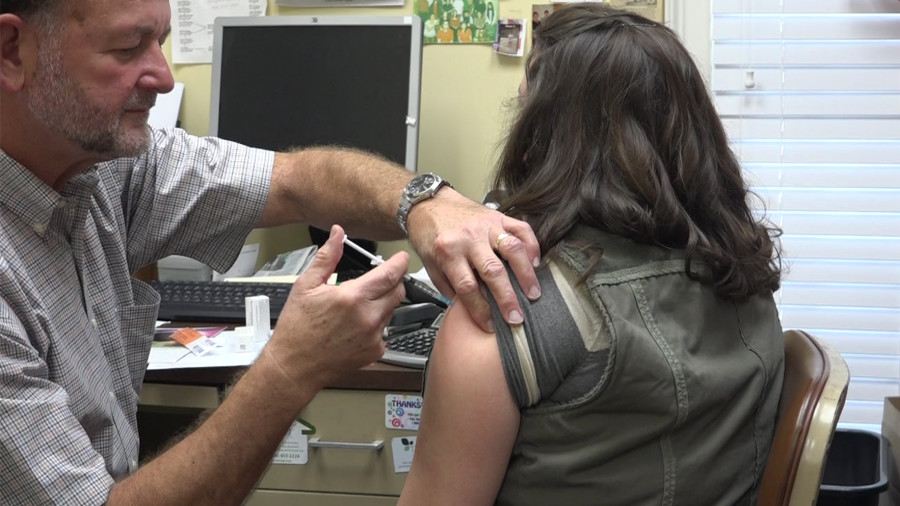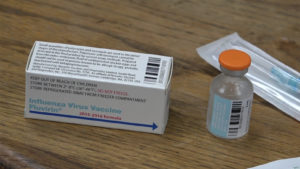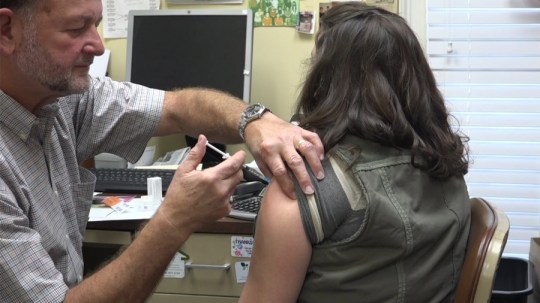A state law that’s been in place for less than six months has improved access to key vaccines for Georgia adults.
The legislation allows pharmacists and nurses to administer vaccines for influenza, pneumococcal disease, shingles and meningitis. This is a big development for Georgia pharmacists, who have been administering flu vaccine to all comers since 2009 and other shots to people with individual prescriptions from a doctor.
Now a pharmacy can enter into a blanket agreement with a local physician, called a vaccine protocol, and can administer any of the four vaccines to walk-in customers.
Individual prescriptions, such as the one that Athens resident Michael Posey got from his doctor shortly before the law went into effect, are no longer needed. He’s been seeing the same family practice physician for years, “and when I was approaching 60, he started recommending that I get vaccine against herpes zoster – the shingles vaccine.”
Posey’s doctor didn’t keep that vaccine in the office, however, and there were some reimbursement issues. “So basically he gave me a prescription, and I eventually got it at a pharmacy,” said Posey, who is a pharmacist himself and a journalist.
People with limited access to a doctor stand to gain from the new law. Several Georgia counties have no primary care doctors, and transportation is an issue for low-income people in rural and urban areas.
Still, 93 percent of Georgia residents live within 5 miles of a community pharmacy.
Insured people such as Posey also benefit from the new rule, since not all doctors offer vaccinations. Physicians who only rarely get requests for inoculations may decide it’s not practical to keep certain vaccines on hand, given the special storage that’s required.
The storage issue is something the public rarely hears about, but vaccines are sensitive. They have limited shelf lives and can be rendered ineffective by too much exposure to heat, cold or light.
“For example, the shingles vaccine has to be kept frozen. It has to be administered within 30 minutes after it comes out of the freezer,” said Andy Ullrich, the pharmacist who owns Hawthorne Drugs, an independent pharmacy that has been operating in Athens since 1977.
Each dose of shingles vaccine is worth about $200, and once it is thawed, it must be used within that half-hour window or discarded.
Ease and access
Many people simply like the convenience of walk-in service at a pharmacy. “If you want to get vaccination at your physician, you’re going to have to make an appointment. And you’re going to have to show up at the time of the appointment,” said Posey. “And physicians have office hours that are ‘Monday to Friday from 8 to 5’ kind of hours.”
Pharmacies typically have longer hours, and customers like to take advantage of those hours. A national study conducted in 2013 found that more than 30 percent of adults who got their shots at drugstores came in the evening, on weekends or on holidays — when medical practices were closed.
Immunizing customers against preventable diseases is an important part of Ullrich’s routine practice, and posters on the walls of Hawthorne Drugs read, “GET YOUR FLU SHOT HERE.”
“We do market it. We do encourage people to get their flu vaccine,” said Ullrich. After pharmacists began providing flu shots in 2009, “the number of people vaccinated went up considerably,” he said.
In September, a public letter from Dr. Anne Schuchat, who is in charge of flu programs for the Centers for Disease Control and Prevention, credited pharmacists with helping reduce the risk of vaccine-preventable diseases over the past 20 years.
In Georgia, the expansion of vaccination by pharmacists took some time. Before the new law was passed, the General Assembly twice had refused to let pharmacists administer adult vaccinations other than flu shots without a doctor’s orders. The Medical Association of Georgia opposed those earlier bills, saying that “the role of the physician cannot be duplicated by the pharmacist.”
Ullrich said doctors have never had anything to worry about. “Undermining the physicians’ authority — that was never the intent of the pharmacist being able to administer vaccines to patients.”
Every dose of vaccine a pharmacist uses is entered into the Georgia Immunization Registry, an online database. “So any health care professional can access that website and see what type of vaccines this patient has received,” said Ullrich.
More than 260,000 pharmacists, which is the great majority of all those practicing in the nation, have been trained to provide immunizations. By 2016, immunization training will be part of the core curriculum for all pharmacy schools, according to the CDC.
[youtube]https://www.youtube.com/watch?v=DA4RAvOWMaE[/youtube]Across the United States, lawmakers are proposing bills that would allow pharmacists to administer more types of vaccines, and to younger patients. These include the HPV vaccine, which protects against viruses associated with cervical cancer, and MMR vaccines, which protect against measles, mumps and rubella.
University of North Carolina researchers see a pattern in these “scope of practice” laws, especially regarding HPV vaccine. Generally speaking, pharmacists in Western states have broader authority to administer HPV than do those on the East Coast.
Georgia is one of the few states that still require physicians’ prescriptions for both the HPV and MMR vaccines.
“Hopefully in the future there will be some other vaccines available that we can give to patients,” Ullrich said.
Ruobing Han is a master’s student in health communication at the University of Georgia. She is especially interested in vaccine promotion.



